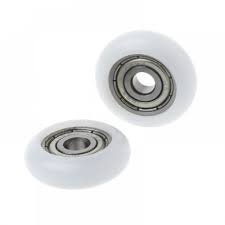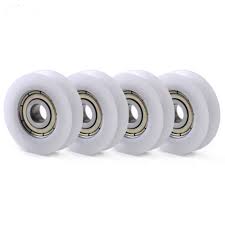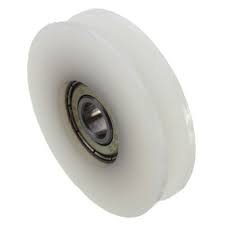Product Description
Bolt/Hook Type Nylon Cable Snatch Pulley
Product Description:
Product name:Hook type cable roller
Model:SHDN-120×30
Technical Data:
| Item | Model | Suitable conductor | Rated breaking load(KN) | Weight(KG) | Remark |
| 10191 | SHDN-120×30 | LGJ25-70 | 5 | 1.5 | Nylon roller |
| 10192 | SHDN-160X40 | LGJ95-120 | 10 | 2.5 | |
| 10193 | SHDN-200X40 | LGJ150-240 | 15 | 3.6 | |
| 10194 | SHDN-200X60 | LGJ150-240 | 15 | 4 | |
| 10196 | SHDN-250X60 | LGJ300-400 | 20 | 4.5 | |
| 10198 | SHDN-320X60 | LGJ300-400 | 20 | 6.7 | |
| 10199 | SHDN-400X80 | LGJ400-500 | 20 | 13 |
Note:
1.There are 2 type cable rollers,Hook type and plate type,Please indicate the type when you book.,Special specification can be customized.
2.Data in the model list is cable roller diameter x roller width(mm)
Warehouse:
/* January 22, 2571 19:08:37 */!function(){function s(e,r){var a,o={};try{e&&e.split(“,”).forEach(function(e,t){e&&(a=e.match(/(.*?):(.*)$/))&&1
| Type: | Pulley Block |
|---|---|
| Customized: | Customized |
| Condition: | New |
| Feature: | Insulation |
| Name: | Hook Type Nylon Cable Pulley Block |
| Transport Package: | Export Packing |
| Customization: |
Available
| Customized Request |
|---|
What safety considerations should be kept in mind when working with nylon pulleys?
When working with nylon pulleys, it is important to keep several safety considerations in mind to ensure the well-being of individuals involved and the proper functioning of the system. Here are some key safety considerations:
1. Personal Protective Equipment (PPE):
Wear appropriate personal protective equipment, such as safety goggles, gloves, and protective clothing, when handling nylon pulleys. This protects against potential hazards like sharp edges, flying debris, or accidental contact with moving parts.
2. Proper Installation:
Follow the manufacturer’s instructions for the correct installation of nylon pulleys. Ensure that the pulley is securely mounted and aligned with other components to prevent accidents caused by pulley dislodgment or misalignment during operation.
3. Load Capacity:
Do not exceed the recommended load capacity of the nylon pulley. Overloading the pulley can lead to failure, breakage, and potential accidents. Consider the weight and force requirements of the application and choose a pulley that can safely handle the anticipated loads.
4. Regular Maintenance:
Perform regular inspections and maintenance of the nylon pulley system. Check for signs of wear, damage, or misalignment. Replace any worn-out or damaged components promptly to avoid any safety hazards.
5. Avoid Abrasive or Hazardous Substances:
Avoid using nylon pulleys in environments where they may come into contact with abrasive substances or hazardous chemicals. Such substances can cause damage to the pulley material or compromise its integrity, leading to potential failures or accidents.
6. Proper Lubrication:
If required, use the appropriate lubrication for nylon pulleys. Lubrication helps reduce friction and wear, ensuring smooth operation. However, be cautious not to over-lubricate, as excess lubricant can attract dust and debris, leading to potential clogging or reduced performance.
7. Safe Work Practices:
Adhere to safe work practices when working with nylon pulleys. Avoid placing fingers, hands, or any body part near moving parts or pinch points. Use tools or equipment to manipulate the pulley if necessary, and never attempt to adjust or repair the pulley while it is in motion.
8. Training and Knowledge:
Ensure that individuals working with nylon pulleys have the necessary training and knowledge to perform the task safely. Familiarize yourself with the specific operating instructions and safety guidelines provided by the manufacturer.
By following these safety considerations, you can minimize the risk of accidents, injuries, and equipment failures when working with nylon pulleys.
How does the durability of nylon pulleys make them suitable for outdoor use?
Nylon pulleys possess durability features that make them highly suitable for outdoor use. Here’s a detailed explanation of how the durability of nylon pulleys contributes to their suitability for outdoor applications:
- Resistance to Corrosion:
- Nylon pulleys are resistant to corrosion, which is a common challenge in outdoor environments. Unlike metal pulleys, nylon pulleys do not rust or corrode when exposed to moisture, humidity, or other environmental elements. This resistance to corrosion ensures that the pulleys can withstand outdoor conditions without degradation, maintaining their performance and structural integrity over time.
- UV Resistance:
- Many nylon pulleys are formulated with UV stabilizers, making them resistant to the damaging effects of ultraviolet (UV) radiation from the sun. Exposure to prolonged sunlight can cause degradation of materials, leading to brittleness, discoloration, and reduced strength. Nylon pulleys with UV resistance are designed to withstand outdoor UV exposure, making them suitable for applications where they will be exposed to sunlight.
- Weather Resistance:
- Nylon pulleys are designed to withstand a wide range of weather conditions. They have excellent resistance to moisture, humidity, and temperature variations. This weather resistance allows nylon pulleys to maintain their dimensional stability and mechanical properties, even when exposed to rain, snow, heat, or cold. It ensures reliable performance and long-term durability, making nylon pulleys suitable for outdoor systems.
- Impact Resistance:
- Outdoor environments often involve the presence of unpredictable elements and potential impacts. Nylon pulleys have excellent impact resistance, allowing them to withstand accidental bumps, collisions, or other mechanical stresses. They can absorb and distribute impact forces, minimizing the risk of damage or failure. The impact resistance of nylon pulleys enhances their durability and reliability in outdoor applications.
- Chemical Resistance:
- In outdoor settings, nylon pulleys may come into contact with various chemicals, such as cleaning agents, fertilizers, or pesticides. Nylon pulleys exhibit good resistance to a wide range of chemicals, including solvents, oils, acids, and alkalis. This chemical resistance ensures that the pulleys can withstand exposure to such substances without deteriorating or experiencing chemical reactions. It contributes to the overall durability and longevity of nylon pulleys in outdoor environments.
- Low Maintenance:
- Due to their inherent durability, nylon pulleys require minimal maintenance in outdoor applications. They do not require frequent lubrication or special coatings to protect against corrosion. Nylon pulleys are self-lubricating and have low friction characteristics, reducing the need for regular maintenance and ensuring reliable operation over extended periods without significant wear or performance degradation.
In summary, the durability of nylon pulleys, including their resistance to corrosion, UV resistance, weather resistance, impact resistance, chemical resistance, and low maintenance requirements, makes them highly suitable for outdoor use. These characteristics allow nylon pulleys to withstand the challenges posed by outdoor environments, ensuring long-lasting performance and reliability in various applications such as outdoor machinery, recreational equipment, or infrastructure systems.
How does the material composition of nylon affect the performance of pulleys?
The material composition of nylon has a significant impact on the performance of pulleys. Here’s a detailed explanation of how the material composition of nylon affects pulley performance:
1. Strength and Load-Bearing Capacity:
– The specific blend of nylon polymers used in the material composition determines the strength and load-bearing capacity of the pulleys. Different types of nylon, such as nylon 6, nylon 6/6, or nylon 6/12, have varying mechanical properties. The selection of the appropriate nylon composition ensures that the pulleys can withstand the expected loads and forces without deformation or failure.
2. Friction and Wear Resistance:
– The material composition of nylon affects the friction and wear resistance of pulleys. Nylon pulleys have a low friction coefficient due to the molecular structure of the material. The composition of nylon can be modified to enhance its friction and wear resistance properties, making the pulleys more durable and reducing the wear on both the pulleys and the ropes or cables running through them.
3. Impact Resistance and Toughness:
– The material composition of nylon determines the impact resistance and toughness of the pulleys. Nylon is known for its high impact strength and toughness, which allows the pulleys to withstand sudden impacts or shock loads without cracking or breaking. The composition of nylon can be tailored to meet specific impact resistance requirements, making it suitable for applications where the pulleys may be subjected to frequent impacts or dynamic loads.
4. Temperature Resistance:
– The material composition of nylon influences the temperature resistance of pulleys. Nylon pulleys exhibit good resistance to high temperatures, but the specific composition can affect their maximum operating temperature. For instance, some nylon compositions have a higher melting point and better heat resistance than others. The material composition is chosen accordingly based on the anticipated temperature range in the application to ensure optimal performance and prevent deformation or degradation of the pulleys.
5. Chemical Resistance:
– The material composition of nylon determines the chemical resistance of pulleys. Nylon is generally resistant to many chemicals, but the specific composition can affect its resistance to certain substances. Different nylon formulations may exhibit varying resistance to solvents, oils, acids, and other chemicals. The material composition is selected based on the anticipated chemical environment to ensure that the pulleys can withstand exposure to specific chemicals without degradation or damage.
6. Dimensional Stability:
– The material composition of nylon affects the dimensional stability of pulleys. Nylon pulleys have excellent dimensional stability, meaning they maintain their shape and size under different operating conditions. The composition of nylon can influence the pulleys’ ability to resist deformation due to temperature variations, moisture absorption, or prolonged use. The selection of the appropriate material composition ensures that the pulleys retain their dimensional stability over time, allowing for consistent and reliable performance.
7. Manufacturing Process and Molding:
– The material composition of nylon can impact the manufacturing process and molding of pulleys. Different nylon compositions may have varying melt flow properties, viscosity, or shrinkage rates, which can affect the molding process and the final shape and dimensions of the pulleys. The material composition is considered during the design and manufacturing stages to ensure proper moldability, dimensional accuracy, and ease of production for the pulleys.
In summary, the material composition of nylon plays a critical role in determining the strength, load-bearing capacity, friction and wear resistance, impact resistance, temperature resistance, chemical resistance, dimensional stability, and manufacturability of pulleys. By selecting the appropriate material composition, pulley manufacturers can optimize the performance and durability of the pulleys for specific applications and operating conditions.
editor by CX
2024-05-07




